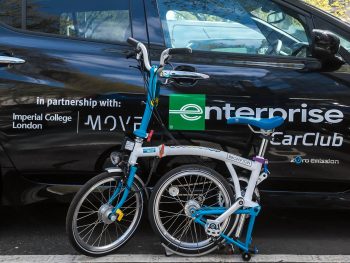Imperial College pilot shows mobility hubs can encourage shared employee travel
A UK-first field trial has revealed that access to a workplace mobility hub can encourage employees to use active and shared travel options more often for commuting and business travel.

The trial showed that offering free access to a car club or bicycle as an alternative to employees’ own vehicles helped increase active and shared travel
The initial findings from an Imperial College London academic study, in partnership with Enterprise and Brompton Bike Hire, showed that when employees were offered free access to a car club or bicycle as an alternative to their own vehicle, they increased the total number of journeys made by bicycle (52% of total journeys) and other active travel (65% of trips) over an eight-week period.
The trial also saw 63% of employees say they planned to cycle more while 25% said they would be less likely to commute using their own car after the positive experience of using the mobility hub.
More than a third (38%) said that knowing they could pick up a zero-emission car club vehicle at work made joining the mobility hub and commuting by bike an easy choice. A similar number said they would be willing to pay to use the mobility hub in the future.
The hub at Imperial’s South Kensington campus was operated over a four-month period and ran two Enterprise Car Club vehicles, one electric and one hydrogen-powered, alongside 25 Brompton folding bikes. These included five electric bikes.
The trial allowed Imperial to assess how giving people more choices for sustainable and active transport impacted staff travel patterns, and to examine how commuting patterns and day-to-day travel can be changed to using shared transport.
Participating employees received free membership and use of Enterprise Car Club and Brompton Bikes for the duration of the pilot. Both cars and bikes were booked through the Enterprise Car Club app.
Ben Lawson, vice president for mobility for Europe at Enterprise, adds: “This trial provides us with the first data-led evidence that workplace mobility hubs can encourage shared and active travel among employees, both for business trips and the commute.”
He added: “Providing more active and zero-emission transport options can help organisations to guide their employees to the most sustainable travel choice and encourage them to leave a higher-emission privately-owned car at home. It is another example of how transport hubs that provide a range of zero-emission shared options for employee travel can shape a better future mobility ecosystem.”

